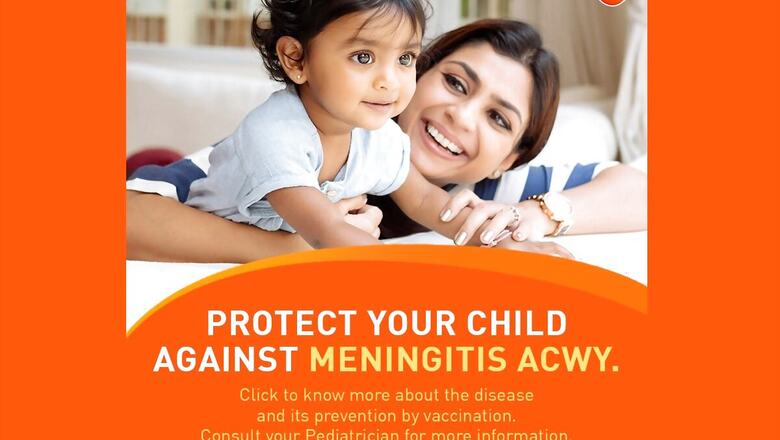
views
As the ongoing pandemic progresses, the role of vaccination has become more crucial than ever. It strengthens your immune system and provides protection against life-threatening diseases by using your own body’s natural defences to build immunity*.
Much like Pneumococcal pneumonia, many other diseases spread by viruses and bacteria are vaccine preventable. One such disease is Meningococcal meningitis. Meningococcal meningitis is associated a high fatality rate.
Meningococcal Meningitis predominantly affects small children and can cause severe brain damage if left untreated. Here’s everything you need to know about this disease and how you can help shield yourself against it.
Understanding Meningitis
Meningitis is a serious infection that affects the protective layer around the brain and spinal cord. It can be caused by bacteria, viruses and fungi. Meningococcal meningitis is caused by the Neisseria meningitidis bacteria, which holds the potential to cause large epidemics#. It can be transmitted from person-to-person through respiratory droplets
Patients are known to have rapidly progressed to death, often within 24 to 48 hours after the onset of symptoms. Even among those who survive, 1 in 5 may experience lifelong complications such as hearing loss, brain damage, mental disabilities or loss of limbs.
Although meningococcal disease can infect anyone of any age, it has often been observed in children under five years of age, immunocompromised individuals, adolescents and young adults.
There have been major improvements in prevention of the disease. One such measure is preventive vaccination and can save lives and reduce complications. In addition, good hygiene & social distancing of kids from infected individuals is also essential for prevention. Here are some of the most common queries about Meningococcal disease, symptoms you need to look out for and how it can be treated.
How does Meningococcal Meningitis spread and what are its symptoms?
From coughing and sneezing to sharing food and drinks and living in close quarters, these everyday behaviours can lead to contracting meningococcal meningitis. The bacteria lives in the nose and throat and is spread from one person to another by close contact.
When it comes to symptoms, meningitis can present as common cold and flu that quickly progresses to high fever or chills, confusion, cold hands and feet, severe aches or pain in the muscles, dark purple rashes, sensitivity to light and neck stiffness.
How to Prevent Meningitis
An effective way to protect your child against meningococcal disease is vaccination.
There are different types of vaccines for different types of meningococcal disease. Meningococcal ACWY Vaccine, the one available in India, helps protect against four major types of meningococcal disease.
Meningococcal disease is serious and poses numerous risks, but with timely vaccination in children, it is possible to protect them. If your child has not been vaccinated previously, consult your doctor now for more information. Together, we can fight and win the war against meningitis.
Reference:
1. Centers for Disease Control and Prevention (CDC). Epidemiology and Prevention of Vaccine-Preventable Diseases. 12th ed. Atkinson W, et al, eds. Washington, DC: Public Health Foundation; 2012. http://www.cdc.gov/vaccines/pubs/pinkbook/index.html#chapters;
2. Thompson MJ; Lancet;2006;367;397-403
3. Rosenstein NE, et al. N Engl J Med. 2001;344:1378-88
4. Centers for Disease Control and Prevention (CDC), 2017. Meningococcal Disease. Clinical Information. https://www.cdc.gov/meningococcal/clinical-info.html
5. Centers for Disease Control and Prevention (CDC), 2017. Meningococcal Disease. Signs and Symptoms
6. World Health Organization (WHO), 2018. Meningococcal meningitis. Factsheet.
7. Centers for Disease Control and Prevention (CDC), 2017. Meningococcal Disease. Causes and Spread to Others
8. Centers for Disease Control and Prevention (CDC), 2017. Meningococcal Disease. Diagnosis and treatment
9. Centers for Disease Control and Prevention (CDC), 2017. Meningococcal Disease. Clinical Information. https://www.cdc.gov/meningococcal/clinical-info.html (Accessed Apr 2021)
10. Centers for Disease Control and Prevention (CDC), 2018. Meningococcal Disease. Prevention
11. ACVIP Immunization update 2021, available at https://www.indianpediatrics.net/jan2021/jan-44-53.htm (Accessed Apr 2021)
# https://www.who.int/news-room/fact-sheets/detail/meningococcal-meningitis#:~:text=Meningococcal%20meningitis%20is%20observed%20in,preschool%20children%20and%20young%20people.
*https://www.cdc.gov/vaccines/hcp/conversations/downloads/vacsafe-understand-color-office.pdf
Disclaimer: Issued in public interest by GlaxoSmithKline Pharmaceuticals Limited. Dr. Annie Besant Road, Worli, Mumbai 400 030, India. Information appearing in this material is for general awareness only. Nothing contained in this material constitutes medical advice. Please consult your physician for medical queries, if any, or any question or concern you may have regarding your condition. Please consult your Pediatrician for the complete list of Vaccine preventable diseases and the complete vaccination schedule for each disease .Please report adverse events with any GSK product to the company at [email protected].
CL code: NP-IN-ABX-OGM-210001, DoP Apr 2021
This article has been created by the Studio18 team on behalf of GSK
Read all the Latest News, Breaking News and Coronavirus News here. Follow us on Facebook, Twitter and Telegram.
















Comments
0 comment